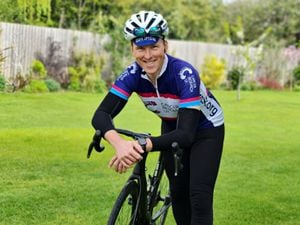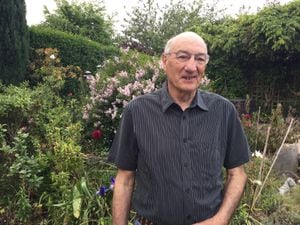Pioneering cyclist surgeon gets into gear to beat cancer
A leading surgeon whose pioneering work is saving bowel cancer patients from invasive surgery is calling on people across the region to get on their bikes for a great cause.

Simon Bach’s research has already spared scores of cancer patients from the trauma of major surgery and managing a colostomy bag for the rest of their lives.
Now he wants cyclists to follow his lead and sign up to Cancer Research UK’s Cycle 300 challenge.
Bowel cancer survivor, Tom Roberts from Stourbridge, said he was immensely grateful to Mr Bach after benefiting from being on his STAR TREC trial.
Participants in the Cycle 300 challenge are asked to raise money for the charity’s life-saving research by getting sponsored to cycle 300 miles during June. The challenge can be completed indoors, outdoors, solo or as part of a team - and cycling to work, the shops or taking on a spin class all count towards the distance.
Mr Roberts, a 69-year-old retired mechanic, was diagnosed with rectal cancer in January 2020, after an at-home test kit picked up tiny traces of blood in his sample.
Initially cancer specialists said his only option was to have a four-hour operation to remove the rectum and fit a stoma bag resulting in a long hospital stay.
“I think what Mr Bach is doing to help people like me is tremendous,” said Mr Roberts. “When I was told I needed to have my rectum removed, I was terrified. I had a relative that died during this exact operation, so I was more scared of the surgery than I was of the cancer. I got a second opinion and was pleased to find out I was eligible for the STAR TREC trial.
“I had a week of radiotherapy treatment with a small operation to remove the remains of the tumour six months later and was pretty much back to normal within a couple of days. I didn’t even have any soreness and I’m back to normal now living the same life as I was before. The more research that can be done the more people can benefit from the same sort of positive outcome as I have.”

“These studies wouldn’t be possible without Cancer Research UK and they’re life-changing for people, so it’s great to be able to give something back through my cycling,” said Mr Bach, a consultant colorectal surgeon at Birmingham’s Queen Elizabeth Hospital and chief investigator for the Cancer Research UK STAR-TREC trial.
“What we’re doing for people with early-stage rectal cancer is substituting big operations that remove the rectum for outpatient treatment with radiotherapy that only takes 10-20 minutes.”
Currently, standard treatment for rectal cancer is major surgery to remove the organ with seven to ten days recovery time in hospital.
Patients signed up to the STAR-TREC trial, run by the CRUK Clinical Trials Unit at the University of Birmingham, receive either high dose radiotherapy over five days or chemotherapy and low-dose radiotherapy over a course of five weeks.
“So far, our studies have shown that 40 per cent of patients need no further treatment while others can have a small operation that removes any remaining cancer without performing major surgery,” added Mr Bach.

“Normally these patients would have to spend a week to ten days in hospital and a lifetime coping with the after-effects of major surgery such as a stoma bag so it’s fantastic to see the look on their faces when they realise they don’t have to go through all of that.”
Fundraising from events like Cycle 300 have enabled Cancer Research UK to invest more than £10 million in Birmingham last year on some of the UK’s leading scientific and clinical research.
Taking part in the challenge needn’t be an uphill struggle as people can choose how, when and where they hit the target - whether they ride 10 miles every day, 75 miles every weekend, or all in one go.
“It’s great for us to sit here and talk about new ways of treating rectal and bowel cancer but it would be great if we didn’t have to deal with it in the first place,” added Mr Bach, a keen cyclist. “That’s where Cycle 300 comes in. We know that things like excess weight and type 2 diabetes work against you as you get older to promote cancer growth so I think this is a great fundraising challenge because you can choose how to do it in a way that fits in with your lifestyle and commitments.
“There’s no better motivation than knowing you’re helping to save lives while keeping fit, so I hope that people will jump in the saddle and help bring hope to the many thousands of families dealing with cancer. We’re making progress every day but we’ve still got a long way to go so every mile counts.”
Paula Young, the charity’s spokesperson for the West Midlands, said: “One in two of us will get cancer in our lifetime. But all of us can play a part to help beat it. For the past 20 years, the incredible commitment of fundraisers taking on challenges like this has helped Cancer Research UK make discoveries that have saved countless lives and benefitted millions of people around the world. But we have so much more to do.
“That’s why we hope Simon’s efforts will spark a chain reaction across the region that will help us keep investing in science today to deliver the treatments of tomorrow. By signing up to Cycle 300 this June, commuters, weekend enthusiasts or gym bunnies alike can help the charity’s scientists go the distance and unlock new and better ways to beat the disease.
“Taking on the challenge has positive health benefits too. Along with helping to build fitness and burn excess calories, cycling regularly encourages a healthier heart and can help to improve mood and sleep.”
Join the challenge and receive a free fundraising pack at cruk.org/cycle300.
